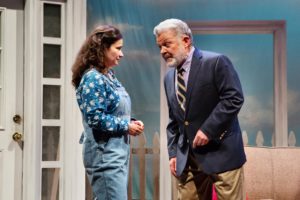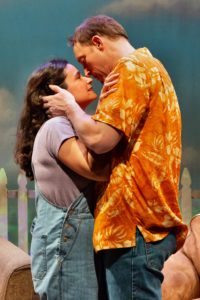“The Property” Show Review by Andrea Santo Felcone
The framework of the play, “The Property,” is intriguing. A woman is struggling to give her teenage son a leg up in society so she reaches out to her ex-husband (a wealthy businessman) to find a job for her floundering son. (The ex-husband had abandoned her son when he was very young—so no love is lost between the two.) The woman is currently married to her second husband (a completely different personality type than her first; the second husband is an unassuming bookseller) when she decides to rent out the cottage on their property for a little extra income. Tensions arise when the woman finds herself attracted to the renter (a teacher who returns her affections). In this web of characters the stage is set for all kinds of interesting drama: tensions between mother and son, wife and ex-husband, wife to attractive stranger, current husband to ex-husband, etc.) The intrigue between these characters could have been very rich, however, the play fails to carry those tensions, mainly due to its problematic writing, especially its stiff dialogue and somewhat unlikeable characters.

Rachel Botchan and Sam Tsoutsouvas. Photo by Hunter Canning / @huntercanning.
The first thing you will notice (other than the nicely-designed set by Caitlynn Barrett) is the stiff and overly-pedantic language of the characters. Almost all of the characters speak in a scholarly manner using words that are much, much larger than necessary. No one speaks in a natural way and in one or two places you will feel sorry for the actors as they (deftly to their credit) weave their way through the thick forest of dialogue.
If you can get past the troublesome language, there will be moments when the actors and the play itself will pull you in, but those moments are short-lived and not enough to carry the production. All told, “The Property” comes up short.
“The Property” spends a lot of time building to something, something that never comes. Todd, the teenager, is angry, “I don’t want to be better, and I don’t even want to be good. I just want to feel good.” (This foreshadows his later drug addiction, and is the only hint given that that is the direction his life will take.) Irene, his mother, is frustrated with Todd, but loves him in a wholly smothering and dysfunctional way, much to the chagrin of the other men in her life. Vernon, by far the most interesting character to grace the stage (Sam Tsoutsouvas is superb), as the avaricious, selfish ex-husband, does show growth throughout the play’s progression. He has a deep love for Irene and will do anything for her, including some unethical matchmaking. Vernon tries to convince Greg (the renter) that he should seduce Irene (as Vernon feels he himself is too old to win her back and Vernon despises Irene’s second husband, Eddie—a man as interesting as milk toast). The monologue where Vernon explains what it was like in the early days of his marriage to Irene (sensual and happy) was a standout moment (although there is some unnecessarily vulgar language).

Rachel Botchan, John Long. Photo by Hunter Canning / @huntercanning.
We are told multiple times that Irene has never cheated on either of her two husbands. And yet, with no real means of explanation, she is drawn to, in fact “loves” Greg, and is tempted to cheat with Greg. Nothing backs this up. Greg and Irene only meet briefly at a common mailbox, not long enough to maintain a conversation, much less the basis for a deep, abiding love. Yet, Irene tells Greg, “… I have known—you could make happy. All of me.” When Greg confesses virtually the same thing (again for reasons unknown) the two launch into an embrace and start to kiss—when they are interrupted. To cover for this adulterous indiscretion, Greg tells Irene he is going to make a Greek salad. (As they separate they list the ingredients he’s going to use in an awkward foreplay. The dialogue here is cringe-worthy and happily the scene doesn’t last long.)
Greg shares many qualities with Eddie, and as such is aimless and uninteresting as well. Perhaps the play would have been better served had Greg shared qualities with both the ex and the current husband, to combine into one interesting character. All in all, most of the characters felt one-dimensional, so much so, it left one to wonder if they weren’t people at all, but representations of characteristics: of greed, of indecision, of anger.
Set in the early 2000s, the play seems to grasp at themes related to America in the pre and post 9/11 period, but it skirts around the issue. We are told that Todd’s birthday is September 12, at which point you might posit that something tragic will happen to him on Sept. 11, as the drama is seeming to build in that direction, but that doesn’t come to fruition. That detail of Todd’s birth just hangs in the air as a loose end. By the play’s end, Eddie is working an airport security guard job (another hint at 9/11). Irene has stated over and over again that she desires “security” so now she has that in the literal form of Eddie’s job. Although this may seem trite, it does lead to one of the play’s few humorous moments: Eddie trying to give away all of the contraband he has collected as security guard: nail clippers, pocket knives, etc. (He has more enthusiasm for the nail clippers than he does most things in his life.)
There was potential for this play, but sadly, the writing misses the mark. The basic outline of the characters was there, but they weren’t adequately fleshed-out. It is unfortunate because the actors each turned in admirable performances. In the end, no character is better off than they were at the start. And while that may be realistic (and truer to life) it falls short in a theatrical production when the themes aren’t clear. While “The Property” doesn’t consistently entertain, it doesn’t educate or explain itself either.
“The Property”: New Light Theater Project Spotlight Series; Written by Ben Josephson; Directed by Robert Kalfin. Performances at The Clurman Theatre at Theatre Row (410 W. 42nd Street, between 9th and 10th avenues) through July 14. http://www.theatrerow.org/clurmannowplaying.
Scenic and Prop Designer: Caitlynn Barrett; Sound and Projection Designer: Andy Evan Cohen; Costume Designer: Gail Cooper-Hecht; Lighting Designer: Paul Hudson.
Cast: Irene: Rachel Botchan; Todd: Phil Gillen; Eddie: Warren Kelley; Greg: John Long; Vernon: Sam Tsoutsouvas; J.J.: Matthew ZanFagna.
Tags: family drama, theatre















